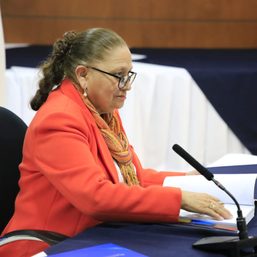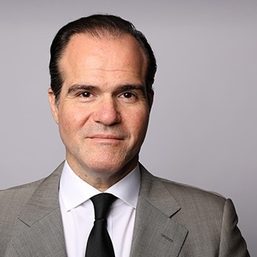SUMMARY
This is AI generated summarization, which may have errors. For context, always refer to the full article.

MANILA, Philippines – With the unclear rules surrounding the implementation of Republic Act 10913 or the Anti-Distracted Driving Act, several senators are calling on the Department of Transportation (DOTr) to put it on hold.
Senator Joseph Victor Ejercito slammed officials of the DOTr and its attached agencies, saying in a statement on Monday, May 22, that they are complicating matters.
“Looks like their officials did not understand the essence of the Anti-Distracted Driving Act. They have made matters complicated, when it is basically just about banning the use of cellphones while driving,” said Ejercito, vice chairperson of the Senate public services committee.
Senate Majority Leader Vicente Sotto III echoed Ejercito’s statement, also saying that the law’s implementation should be suspended until motorists’ concerns are settled. (WATCH: Rappler Talk: What is the Anti-Distracted Driving Act?)
“I am about to call the attention of the [Senate] committee on public services and if possible call for a ceasefire or a halt in the implementation of the Anti-Distracted Driving [Act],” Sotto told reporters.
“They (transport authorities) expanded the law. I think what we should do is sit down, study the IRR, talk about the way we passed the law. The real intention of the law is [to ban] talking and texting using the cellphone in a vehicle or by drivers… [Now], masyadong maraming reklamo (we have received so many complaints from motorists),” he added.
What is ‘line of sight’?
A top concern of motorists is the use of navigation apps via mobile phones – which transport authorities consider a distraction that should not obstruct the driver’s “line of sight.”
But Ejercito pointed out that cellphones, “when used for navigational purposes,” aid motorists in “steering clear of heavy traffic.”
“We rarely hear of road accidents that result from the use of navigational apps. Definitely, texting and tinkering with a mobile phone while driving is a no-no. But when it is used as a navigational aid and it is properly placed, it is okay,” the senator added.
Ejercito also echoed motorists’ view that it is more dangerous when cellphones with navigation apps are placed out of sight or out of reach.
“It is counterintuitive when using Waze or other navigation apps since the use of cellphone is less dangerous if it is within the line of sight. Every second that the driver’s eyes are on the road counts. Mas delikado pa yumuko (It’s more dangerous to look down)!” the senator said.
Sotto also said: “What do they mean by line of sight? In my case I drive a car with the heads-up display, do I tell my car manufacturer to remove the windshield? Palagay ko medyo lumampas eh, parang na-expand masyado ‘yung batas na naipasa namin (I think they overstepped the limits of the law, the law that we passed was expanded too much).”
‘Muddled & overboard’
Senators Richard Gordon and Nancy Binay also want a review of the Anti-Distracted Driving Act’s implementing rules and regulations (IRR).
With the rules of the DOTr, Binay said the law seems to have become muddled.
“Parang nalusaw ‘yung intent of the law, which was really to prohibit ‘yung text and call while driving. Parang ngayon, kung saan-saan na napunta ‘yung IRR. Panawagan ko i-review muna siguro ‘yung IRR. Ang nangyayari, every day ata pabago-bago ‘yung interpretations sa IRR,” she said.
(It’s like the law was watered down. The intent of the law was really to prohibit texting and calling while driving. But now, the IRR is all over the place. My appeal is to first review the IRR. What’s happening is that every day the interpretations of the IRR are changing.)
Both Binay and Gordon also criticized the prohibition of accessories such as rosaries hung on rearview mirrors and air fresheners placed on dashboards, which was included in a 2014 Joint Administrative Order by the DOTr. (READ: Motorists told to remove rosaries, toys on dashboards by May 26)
“Parang sumobra, hindi naman ako naniniwala na pati ba naman ‘yung rosary at saka air freshener dapat ipagbawal,” said Binay, who is set to file a Senate resolution calling for an inquiry into the issue.
Gordon, for his part, said about the rosaries: “I think that’s OA, that’s going overboard. Anything that will bar or create dangerous situations for the car and its passengers and people in highways should be policed… but sobra na ‘yun (that’s too much).”
Striking a balance
Senator Paolo Benigno Aquino IV, meanwhile, said it is important for the authorities to be reasonable and also for motorists to learn how to follow rules.
“Ang mga batas na [ito], ginawa ‘yan para sa safety ng taong bayan. Maybe initially may mga difficulties ‘yun but eventually I hope matuto rin tayo na sumunod sa patakaran ng batas. On the other hand, kailangan maging reasonable rin iyong ating authorities,” he said.
(These laws were created for the safety of the people. Maybe initially there will be difficulties but eventually I hope we’ll learn how to follow the rules. On the other hand, authorities also need to be reasonable.)
Before a law can be implemented, there should first be an IRR to guide enforcement.
But Gordon said IRRs, in general, are the “most abused thing” as these could be crafted in such a way that they “change” the law.
“We can review that, we can express our sense na (that) they shouldn’t do that,” he said. – Rappler.com
Add a comment
How does this make you feel?


![[WATCH] Try This: Empanada Salteña from Argentina](https://www.rappler.com/tachyon/2023/04/try-this-empanada-saltena-argentina.jpg?resize=257%2C257&crop=765px%2C0px%2C1037px%2C1037px)


There are no comments yet. Add your comment to start the conversation.